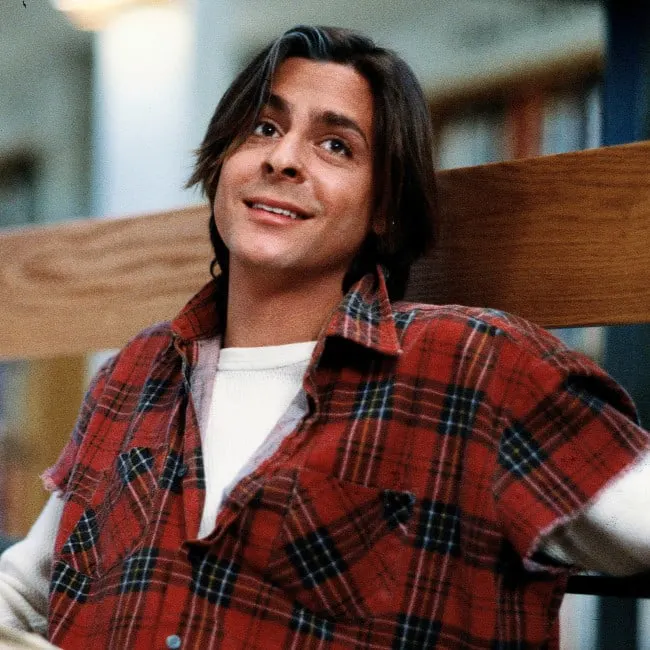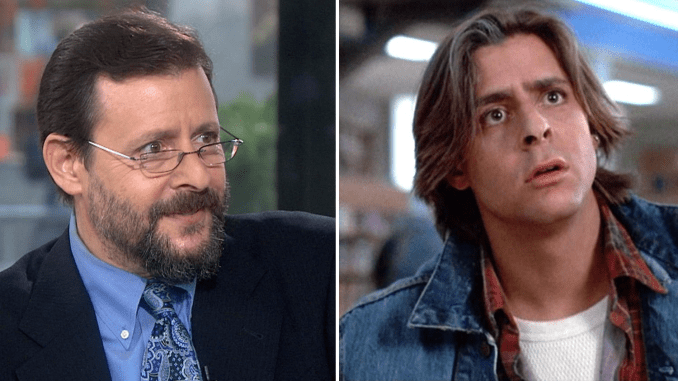When you think of Judd Nelson, it’s impossible not to conjure images of the rebellious John Bender from The Breakfast Club or the ambitious Alec Newbury from St. Elmo’s Fire. A defining figure of the 1980s, Nelson has built a career on unforgettable performances while maintaining a mystique that’s rare in Hollywood. From his humble beginnings to his enduring legacy, let’s explore the life and career of this enigmatic star.
Early Life: A Journey Shaped by Complexity

Judd Asher Nelson was born on November 28, 1959, in Portland, Maine, into a Conservative Jewish family. His father, Leonard Nelson, was a corporate lawyer, and his mother, Merle Nelson, was a mediator and state legislator. Raised in a household where education and culture were deeply valued, Nelson’s early life wasn’t without challenges. Attending St. Paul’s School, a prestigious boarding institution in New Hampshire, he faced antisemitism, an experience that would later shape his perspective on life and career.
Nelson initially enrolled at Haverford College but left to pursue his passion for acting. Moving to Manhattan, he studied under Stella Adler, one of the most influential acting coaches of the time, immersing himself in the craft that would define his life.
Breaking Through in the 80s: The Brat Pack Era
The 1980s were a turning point for Nelson, catapulting him into stardom as a key member of the “Brat Pack,” a group of young actors who became synonymous with the era. His breakout roles came in 1985 with The Breakfast Club and St. Elmo’s Fire.
As John Bender in The Breakfast Club, Nelson delivered a performance that captured the raw, rebellious spirit of teenage angst. Directed by John Hughes, the film became an instant cultural phenomenon, with Nelson’s portrayal remaining iconic decades later. Meanwhile, in St. Elmo’s Fire, he showcased his versatility as Alec Newbury, a character grappling with the complexities of post-college life.
These films not only made Nelson a household name but also solidified his place in Hollywood history. His impact extended beyond acting, with appearances in memorable music videos like John Parr’s “St. Elmo’s Fire (Man in Motion)” and Simple Minds’ “Don’t You (Forget About Me),” further cementing his connection to the 80s zeitgeist.
Expanding Horizons: A Voice That Resonates
Nelson’s talent wasn’t confined to on-screen roles. In 1986, he voiced Hot Rod/Rodimus Prime in The Transformers: The Movie, bringing gravitas and emotional depth to the animated character. His narration of the acclaimed documentary Dear America: Letters Home from Vietnam also earned critical praise, showcasing his ability to connect with audiences through his voice alone.
The 90s: Reinventing the Actor
As the 80s gave way to the 90s, Nelson reinvented himself. He tackled grittier roles, starting with the World War II drama Hiroshima: Out of the Ashes. In New Jack City (1991), he starred alongside Wesley Snipes and Ice-T in a hard-hitting urban crime classic. Meanwhile, the dark comedy The Dark Backward highlighted his willingness to take on unconventional projects.
Television also became a significant part of his career during this period. His role as Jack Richmond in the sitcom Suddenly Susan revealed his comedic chops, earning him a new fan base. The show’s success further demonstrated Nelson’s ability to adapt to changing industry trends while staying true to his craft.
A Private Life: The Mystery of Judd Nelson

In an age where celebrities’ lives are often an open book, Judd Nelson stands apart. He has kept his personal life remarkably private, avoiding the trappings of fame that ensnare so many in Hollywood. No high-profile relationships, no tell-all memoirs, no social media oversharing—just an unrelenting focus on his work.
Why the secrecy? Perhaps Nelson understands that mystery can be a powerful tool. By keeping the spotlight on his performances rather than his personal life, he’s cultivated an aura that makes him all the more intriguing.
The 2000s and Beyond: Consistency Over Flash
The turn of the millennium marked a quieter yet steady phase in Nelson’s career. He appeared in guest roles on popular shows like CSI: Crime Scene Investigation, Psych, and Two and a Half Men, proving his versatility as an actor. His film credits during this time included Cabin by the Lake (2000), its sequel Return to Cabin by the Lake (2001), and The Boondock Saints II: All Saints Day (2009).
One standout role was his portrayal of Chris Frost—aka Santa Claus—in the Hallmark film Cancel Christmas (2010), which added a heartwarming touch to his diverse portfolio. More recently, Nelson showcased his dramatic range in the Lifetime thriller Girl in the Basement (2021), delivering a chilling performance that reminded audiences of his enduring talent.
Judd Nelson’s Legacy: A Star on His Own Terms

What makes Judd Nelson’s legacy so compelling? It’s his refusal to conform. While many actors chase fame, Nelson has always prioritized the art of storytelling. From his iconic roles in 80s classics to his steady contributions in film, television, and voice acting, he’s built a career that speaks volumes without shouting for attention.
In a world where oversharing is the norm, Nelson’s enigmatic nature is a breath of fresh air. He’s an actor who lets his work do the talking—a rarity in Hollywood. And that, perhaps, is why his legacy continues to endure.
Conclusion

Judd Nelson remains one of Hollywood’s most fascinating figures. From his breakout performances in The Breakfast Club and St. Elmo’s Fire to his steady work in television and film, he’s proven that true talent doesn’t need a constant spotlight. His ability to captivate audiences while maintaining a private life sets him apart, making him a star who truly shines on his own terms. Judd Nelson is more than just an actor—he’s a timeless icon whose legacy will inspire generations to come.


